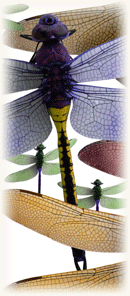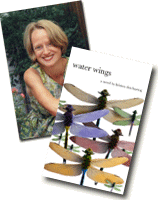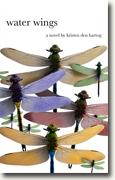Do you think Mick and Darlene would ever have reconciled had he not
died so tragically?
Again and again, I suspect. But the reconciliations would be more like collisions.
I love Wren's character. How does her birth defect affect her actions towards others? Do others in the story view Wren differently because of her deformed hands?
Wren’s born into the knowledge that she’s different – which is how we each feel about ourselves, isn’t it, but she has a physical manifestation of that, which sets her apart even further, and raises questions about our ideas around beauty and goodness. For instance, Darlene is physically gorgeous, and Wren is deformed. Emotionally, the opposite is true. As to how they treat people, Wren is magnanimous and forgiving, while Darlene is unwittingly cruel and self-involved. To take that a step further, Darlene recoils from insects, while Wren is drawn to that world partially because of her disappointment in the human one.
As to how people treat Wren, I think the only characters unaffected by her deformity are Hannah and Vivian, who have grown up with her and think of her as normal…. Whereas kids like Lucy (and later Stuart) alternately ridicule her and try to befriend her precisely because she’s an anomaly.
As far as motherhood, Wren's mother, Angie, is more responsible than her sister Darlene, yet she fails to appreciate the beauty (inside and out) of her own daughter. Why?
Guilt, I suppose. Guilt that the product of her and Charlie’s love is imperfect, guilt that she even thinks of her daughter as imperfect. Bigger than her inability to see Wren’s beauty is her fear for her daughter, and her awareness of the difficulties she’ll face in her life – and of course this fear and awareness only adds to Wren’s challenges.
Wren is a touchstone for her cousins, the repository of their history. What does each sister bring to the circle of friendship they share?
Vivian brings fearlessness, sarcasm and muscle – it’s through her that Wren understands she’s being ridiculed by the kids at school, and while Vivian seems cruel for showing her, Wren is stronger, eventually, with the knowledge. Similarly, Vivian lifts Hannah to look into their father’s apartment window. Hannah brings faith and innocence to the circle. After the fight on the beach, and Vivian’s cruelty toward Wren in the water, it’s Hannah Wren looks for, a speck of pink coming through the trees. And when Vivian soothes her sister to sleep, telling her the story of Ursa Minor and Ursa Major, she soothes herself by the very nearness of Hannah.
Would you consider Wren an outcast, living her life the way she does? How does Wren's child add to her separateness from the town at large?
An outcast, yes, but also an outsider looking in, which means she can often see the goings-on more clearly. Her separateness from the town at large probably brings her closer to the reader, and allows her to act as a kind of conduit.
Wren's character is central to the emotional plot line, particularly her accepting and forgiving nature. Yet the action revolves around Hannah, Vivian and Darlene. How does this happen?
In the earliest draft of the story, Wren was actually quite a minor character. It was only as the book evolved that I saw her potential, and her ability, as mentioned above, to give the readers a window into the Oelpke family. She can tell us things that Hannah and Vivian can’t, because of her distance, but she’s also close enough to be affected by their tragedies, and connected enough to have her own tragedies matter to the rest of the story. Her presence also allows us to see two families, two different styles of parenting, side by side, and recognize the strengths and weaknesses of each.
 After Mick, Darlene chooses a number of unattractive men, none as handsome as her former husband. Is she subconsciously punishing herself?
After Mick, Darlene chooses a number of unattractive men, none as handsome as her former husband. Is she subconsciously punishing herself?
The important thing to remember is that we see these men, for the most part, through the eyes of Hannah and Vivian. For them, no one can live up to Mick. They might not seem nearly so unattractive through the eyes of other characters. But also — Darlene craves adoration. She loves Mick partly because he had the strength to call her bluff in so many ways, but that kind of relationship takes work and compassion. The men she takes up with afterwards (Jay, and especially Tim) require little work at all – but also bring her short-term satisfaction, like candy.
As a reader, I'm never quite sure of the truth, on the verge of finding answers at critical times in Hannah and Vivian's lives. Are we meant to find answers to the mysteries in the story?
Only the kinds of answers that raise more questions.
The beauty of rural Canada is a setting in both of your novels, The Perpetual Ending and Water Wings, really an integral part of the story. Does the natural beauty of your surroundings affect your creativity and story ideas?
I’ve been writing about that part of the world for a long time now. The setting of the novels, as I mentioned, is a big part of my own history. It’s in me to describe that place. No matter where I live, I take it with me. I’m working on a third book now, also set in the valley, but I can feel myself getting ready to move on to new territory. Which doesn’t mean that this landscape won’t continue to influence me, or inspire me in a less direct way.
Are you working on any more projects currently? Can you share with us?
The next novel, The Origin of Haloes, will hopefully be ready for publication in 2005 … but a new gurgling baby keeps me awfully busy. The Origin of Haloes draws on classical mythology, Renaissance masterpieces, and the history of the Olympic Games, in order to tell the story of a family with a deep dark secret, and a father last seen headed for the river with a canoe on his head.
Do you have any words of wisdom for aspiring writers?
Read. Travel. Listen. Observe. One of the greatest things about being a writer is that living helps you get better at it.




